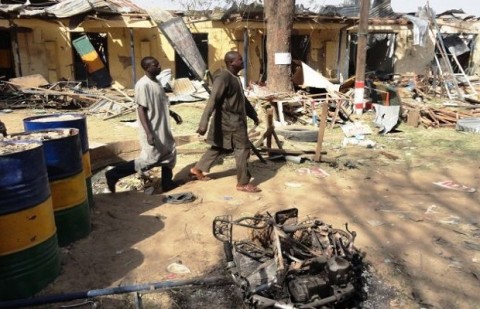Information reaching 247ureports.com through sources in Borno State, northeastern Nigeria indicate that the menace of the Islamic Jihad group may have returned to the town of Gwoza located 140kilometer south east to the State capital of Borno, Maiduguri. As gathered, unknown gunmen cladded in Nigerian military camouflage attacked and dramatically invaded the town during the early morning hours of Wednesday, around 4am. The monarch of Gwoza is feared to have been kidnapped or killed.
The town of Gwoza has suffered repeated attacks by the Islamic Jihadist group, Boko Haram. One of the recent major attacks occurred on May 30, 2014 resulting in the murder of the father to the monarch of Gwoza.
Competent sources who spoke to our correspondent from the hills of Cameroon revealed that many lives were lost as a result of the invasion by the unknown gunmen. According to the source, the gunmen had drove into the town armed with highly sophisticated armored tankers and other attack vehicles. The vehicle were all painted in Nigerian military camouflage.
Following the completion of the initial incursion into the town, the unknown gunmen, according to the source, mounted their flags and other war paraphernalia, and began parading around the corners of the town –in a manner depicting conquest of a territory. Amidst the unsettled atmosphere – as the town resident scampered for safety, the whereabouts of the monarch of the town remain uncertain. Unverified information indicates that the emir’s palace was attacked by the Jihadist group. The father to the Monarch was killed in the attack of May 30, 2014 by the Jihadist group.
Efforts to reach the security officials stationed at the state did not yield a response. However government officials at the Government House Maiduguri indicate that information coming out of the Gwoza remain scanty and limited. They expressed worries over the lack of information on the Emir’s whereabouts.
Background –
In April 2014, residents in Gwoza LGA reported that Boko Haram members fleeing from Sambisa Forest had moved into their towns on motorcycles, “being spotted in Patawe, Fadagwe, Wala, Uvaha, Gatha, Jige, Warabe and Ngoshe” villages. Motorcycles had been banned throughout Borno State for almost two years, and were rarely used by non-Boko Haram members.
According to House of Representatives member, Hon. Peter Biye Gumtha, since the beginning of the Boko Haram attacks, “over 200 churches have been completely razed down, leaving only 8 functional churches in the whole of Gwoza Council area.” As of January 2014, Biye was “the only Christian House of Representatives member from Borno State.” He remarked:
“What is happening in my constituency is very unfortunate and frightening. People are being killed by terrorists on a daily basis, Churches are being burnt, and if people like me who is also a member of the House Committee on Army, alerted military authorities based on intelligence reports that my village would be under attack by terrorists, and nothing was done to secure the area, then it is unfortunate, because the ordinary people that live in volatile areas are no longer safe and protected by our security outfits.
On 30 May 2014, the traditional ruler, the Emir of Gwoza, Idrissa Timta, was killed after he was abducted with his colleague, the Emir of Uba, Ismaila Mamza, by armed men, in Hawul LGA. “His convoy was ambushed while he was on the way to attend the funeral of his deceased colleague, the Emir of Gombe, Alhaji Shehu Abubakar.”
Governor Kashim Shettima of Borno State traveled to Gwoza, accompanied by a sizeable military escort, to pay his last respects to the late Emir of Gwoza. As of June 2014, the Maiduguri-Bama road to Gwoza has been designated a “no-go zone” due to an “upredictable security situation”. A journalist accompanying the Emir counted “16 towns, villages and hamlets that were completely deserted along the 135km road.” In his eulogy, Governor Shettima described the late Shehu Idrissa Timta as “a man who spent better part of his reign preaching peace and tolerance.”
On June 12, 2014, Idrissa Timta’s son, Muhammad Timta, (also called Alhaji Muhammad Shehu) became the new Emir of Gwoza. He “promised to unite and strengthen the relationship between Christians and Muslims in the area.”
On June 2, 2014, in an event that has been called the Gwoza massacre, “No fewer than 300 villagers were reportedly killed in three communities around Gwoza local government area of Borno State” by gunmen suspected to be members of Boko Haram. “The militants arrived in Toyota Hilux pickup trucks – a common vehicle for the military – and told civilians they were soldiers there to protect the local population … The gunmen reportedly gathered people in the center of the villages and fired on them. As people attempted to flee, militants on motorcycles waited outside the villages and attacked them.” On 8 June 2014, the spokesperson for a group of religious and political leaders in Gwoza LGA, Dr Asabe Vilita, (also Borno Commissioner for Commerce and Investment), said:
“We wish to state categorically clear that there is no outbreak of religious war in our communities in Gwoza as being speculated, especially in the social media. What our people are facing is full-scale insurgents’ attack and terrorism. Although sometimes people have disagreements due to the confusion caused by the attacks in different areas, our people have since identified the insurgents as common enemy and have decided to unite in fighting them.”
She said 1,290 people had been displaced, and that “most people had to escape to Maiduguri,” where three camps have been set up. According to Vilita, “four of the six communities in Gwoza East are currently under siege by the insurgents”: Ngoshe, Agapalwa, Ashigashiya and Cikide. On 22 June 2014,
The insurgents were said to have taken over most outskirts of Gwoza including Pulka and Kirawa Towns, forcing residents to flee into neighboring Cameroon villages of Mura and Marwa, some 75km away from Nigeria borders.








